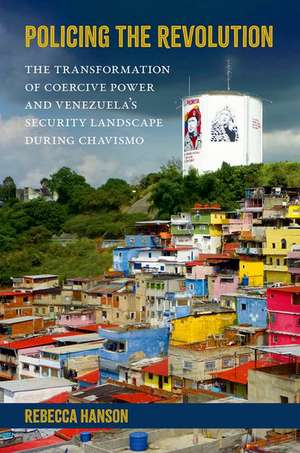Policing the Revolution: The Transformation of Coercive Power and Venezuela's Security Landscape During Chavismo: Global and Comparative Ethnography
Autor Rebecca Hansonen Limba Engleză Paperback – 29 apr 2025
Preț: 135.28 lei
Preț vechi: 173.73 lei
-22% Nou
Puncte Express: 203
Preț estimativ în valută:
25.89€ • 27.10$ • 21.42£
25.89€ • 27.10$ • 21.42£
Carte nepublicată încă
Doresc să fiu notificat când acest titlu va fi disponibil:
Se trimite...
Preluare comenzi: 021 569.72.76
Specificații
ISBN-13: 9780197680827
ISBN-10: 0197680828
Pagini: 280
Dimensiuni: 156 x 235 mm
Editura: Oxford University Press
Colecția OUP USA
Seria Global and Comparative Ethnography
Locul publicării:New York, United States
ISBN-10: 0197680828
Pagini: 280
Dimensiuni: 156 x 235 mm
Editura: Oxford University Press
Colecția OUP USA
Seria Global and Comparative Ethnography
Locul publicării:New York, United States
Recenzii
Hanson's Policing the Revolution provides counterintuitive insights into the nature of politics and the state in Bolivarian Venezuela. The book addresses important and complex puzzles that fit Venezuela into debates about violence in Latin America, highlighting similarities but also key differences. Hanson perceptively shows that violence and crime in Venezuela emerge, in part, because of decisions made by state leaders that keep the police disorganized, thus reducing their capacity to engage in effective law enforcement and shifting the balance of police power in the country. Hanson's detailed and incisive ethnography of Venezuelan police provides critical insights into politics in that country and its police forces.
Our understanding of contemporary Venezuela has been impeded by broad brushstroke analyses that fail to penetrate some of the most important phenomena at play. Based on ten years of careful fieldwork-including participant observation with police officers in the most difficult of circumstances-Hanson provides one of the most insightful books that has been written on the Chavista period. Rather than the classic story of state-sponsored violence in service of authoritarian control, she reveals the pluralization of violent actors and the continual destabilization of relations between them. Hanson's access point is a focus on policing and security, but this is a book about the Bolivarian Revolution. All Venezuela scholars need to engage this text.
Policing the Revolution is a remarkable book offering an extraordinarily comprehensive account of the evolution of Venezuela's Bolivarian Revolution and Chavismo through the lens of policing and coercion, offering one of the few (and certainly the most robust) analysis to date on the left's approaches to security. The book's deep ethnographic approach masterfully pairs a focus on street-level officers with the vantage point of ordinary barrio residents to analyze how the revolution is experienced "from below." Rarely do we see ethnographies that consider police officers alongside the communities that bear the brunt of their abuses. By considering both perspectives jointly, we get a more nuanced and realistic understanding of the everyday practices that lay bare the contradictions of the Bolivarian Revolution
Our understanding of contemporary Venezuela has been impeded by broad brushstroke analyses that fail to penetrate some of the most important phenomena at play. Based on ten years of careful fieldwork-including participant observation with police officers in the most difficult of circumstances-Hanson provides one of the most insightful books that has been written on the Chavista period. Rather than the classic story of state-sponsored violence in service of authoritarian control, she reveals the pluralization of violent actors and the continual destabilization of relations between them. Hanson's access point is a focus on policing and security, but this is a book about the Bolivarian Revolution. All Venezuela scholars need to engage this text.
Policing the Revolution is a remarkable book offering an extraordinarily comprehensive account of the evolution of Venezuela's Bolivarian Revolution and Chavismo through the lens of policing and coercion, offering one of the few (and certainly the most robust) analysis to date on the left's approaches to security. The book's deep ethnographic approach masterfully pairs a focus on street-level officers with the vantage point of ordinary barrio residents to analyze how the revolution is experienced "from below." Rarely do we see ethnographies that consider police officers alongside the communities that bear the brunt of their abuses. By considering both perspectives jointly, we get a more nuanced and realistic understanding of the everyday practices that lay bare the contradictions of the Bolivarian Revolution
Notă biografică
Rebecca Hanson is Assistant Professor at the University of Florida, with a joint appointment in the Department of Sociology and Criminology & Law and the Center for Latin American Studies and director of UF's International Ethnography Lab. Her research focuses on how policies and political changes that seek to reduce inequality and violence end up contributing to these problems and how changing modalities of violence in the 21st century affect state building and capacity, with a specific focus on policing. She is the coauthor of Harassed: Gender, Bodies, and Ethnographic Research (University of California Press, 2019) and co-editor of The Paradox of Violence in Venezuela: Revolution, Crime, and Policing during Chavismo (University of Pittsburgh Press, 2022).











